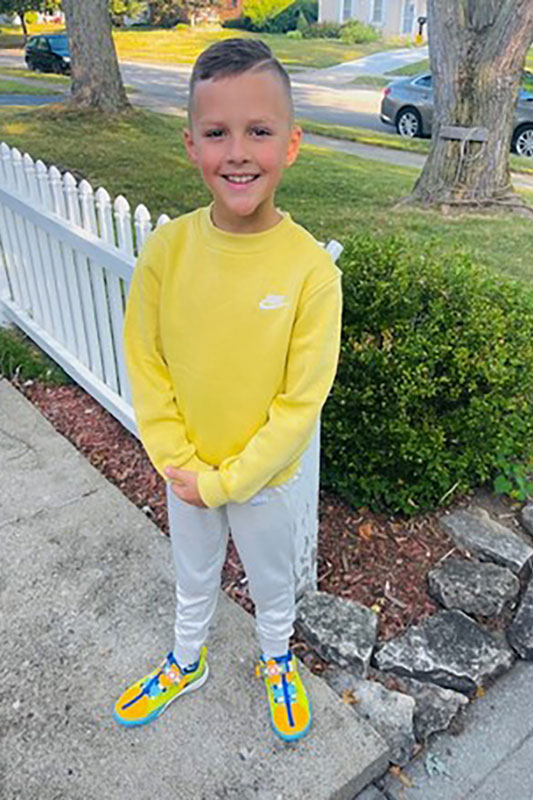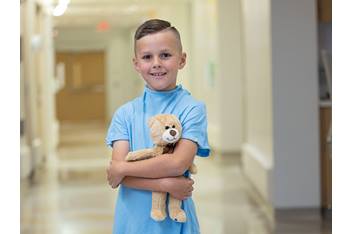Name: Kai
Condition(s):
- Diabetes Type 1
Specialty(s):
Age at Treatment: 2
Age Today: 9 Years
Meet Kai

Where are they now?
Catching up with Kai one year later.
In 2018, Kai was brought to his local hospital because he was exhibiting what his family later learned were tell-tale signs of type 1 diabetes. Upon diagnosis, Kai was transferred to Nationwide Children's Hospital so his care team could teach him and his family what diabetes care entails. Throughout his two-day admission, Kai met with dietitians, social workers, diabetes educators, and the endocrinology team.
He and his family learned how to administer insulin, count carbohydrates, navigate insurance, manage the diagnosis while traveling, and how to teach others who may be caring for Kai.
As he has grown, Kai has become more involved in his management, pricking his own finger for blood glucose readings, counting carbs, and delivering insulin through his pump with assistance from caregivers. Kai is doing a great job at keeping his blood sugar and A1c in the proper range and living a healthy lifestyle.
Just after the holidays in 2018, Kai was brought to his local hospital because he was exhibiting some symptoms that seemed out of character. Kai’s mom, Jessica, noticed his increased thirst, hunger and urination. Though she didn’t know it at the time, all are tell-tale signs of type 1 diabetes. Type 1 diabetes is an autoimmune condition, meaning that children have reduced or no ability to make insulin, becoming dependent on insulin injections for life.
Kai was transferred to Nationwide Children's Hospital. Though not critically ill upon arrival, Kai was admitted so his care team could teach him and his family what diabetes care entails. Throughout his two-day admission Kai met dietitians, social workers, diabetes educators and the endocrinology team. He and his family learned how to administer insulin, count carbohydrates, navigate insurance, manage the diagnosis while traveling, and how to teach others who may be caring for Kai. “It’s a lifelong diagnosis that requires constant day-to-day care,” explains Dr. Kajal Gandhi, endocrinologist at Nationwide Children’s. “We bring families into the hospital to alleviate some of those concerns and empower them to have some of those basic tools that they require when they go home to take care of their child.”
Today, Kai and his mom have integrated a routine into their daily lives to manage his diagnosis. He wears a continuous glucose monitor that tracks his blood sugar constantly and alerts his mom if it drops too low or rises too high. “He gets his insulin dose before each meal, before he snacks, or if he eats anything with carbs in it,” says Jessica. “We’re taking a lot of time to make sure he’s healthy. It’s a 24/7/365 thing.” It may be a daunting undertaking, but Kai’s family is not alone.
The endocrinology clinic focuses on teamwork. Not only teaching families how to care for their child but also directly teaching schools and daycares how to care for a diabetic student. “I’m inspired by how dedicated our team members are to these children,” Dr. Gandhi says. “We want them to leave knowing that they are able to take care of their child and empowered to inspire others.”
Consider contributing to the Light Up the Lawn, Light Up a Life campaign this holiday season and support lifesaving research and care for kids like Kai.




